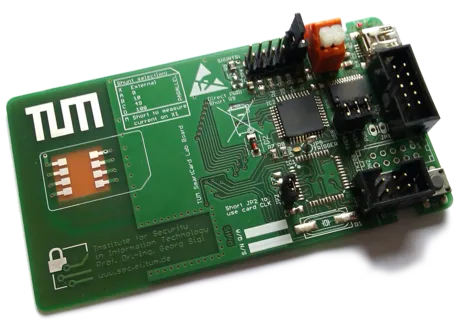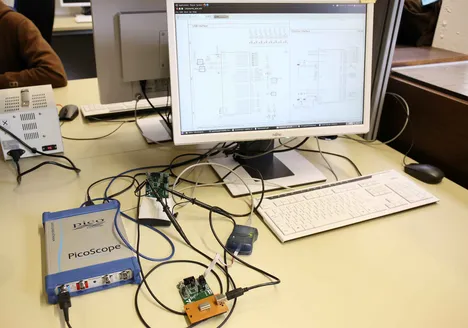SmartCard Lab
| Lecturer (assistant) | |
|---|---|
| Number | 0000001291 |
| Type | research lab training |
| Duration | 4 SWS |
| Term | Wintersemester 2024/25 |
| Language of instruction | German |
| Position within curricula | See TUMonline |
| Dates | See TUMonline |
- 23.10.2024 10:00-11:30 N1005ZG, Seminarraum
- 31.10.2024 13:00-14:30 N1005ZG, Seminarraum
- 06.11.2024 09:30-11:00 2947, Praktikantenraum
- 11.12.2024 08:30-12:00 N1005ZG, Seminarraum
- 22.01.2025 08:30-12:00 N1005ZG, Seminarraum
- 06.02.2025 14:00-17:30 N1011ZG, Prof.-Büro
Admission information
Objectives
Description
Prerequisites
The following modules should be passed before taking the course:
- Cryptography
- C/C++ Lab (or similar)
It is recommended but not mandatory to take the following modules additionally:
- Secure Implementation of Cryptographic Algorithms
Teaching and learning methods
Teaching method:
Aside from two mandatory sessions at the beginning of the semester and the presentations at the end of the semester, the students are free to schedule their work hours. It is recommended that the students make regular appointments with the advisor or tutor to discuss the progress of the project. The project work is carried out by the students in small groups. Lab rooms of the institute are open during the University’s working hours and support from a tutor or advisor is offered during the lapse of the whole project.
Examination
- Lab work: Work is to be carried out and documented in groups; each student must keep a lab protocol.
- The capability to create complex embedded systems in practice is shown in a 30-minute presentation on the project and subsequent discussion. This contributes to 50% of the final grade.
- The theoretical knowledge on the topics is examined during a 10-minutes long oral examination. This contributes to the other 50% of the final grade.
Recommended literature
Understanding Cryptography, Christof Paar and Jan Pelzl, ISBN-13: 978-3-642-04100-6
Links
Additional Information


Offered in winter and summer semester.
Course
During the course of this lab, students learn how attacks on the implementation of cryptographic algorithms (so-called Side-Channel Attacks) work, and learn to implement countermeasures that help thwart these attacks. Students work in groups of 2-3 people. <br/> The attacks are carried out with high-precision, high-resolution oscilloscopes. The data measurements are then processed with Matlab on a PC. The cryptographic algorithms with the attack countermeasures are implemented on 8-bit microcontrollers, which can be accessed via a standard interface with a smartcard reader (ISO 7816 UART).
Introduction to the Lab: Introduction to the lab tasks, and presentation of attack scenarios
Introduction to DPA (Differential Power Analysis): Overview of the AES algorithm, attacks on the implementation of AES and demonstration.
Integration phase:
Creation of a clone card by using a key extracted by performing attacks on the reference card.
- Work distribution:
- Team A: Differential Power Analysis (DPA) attack, extraction of cryptographic keys, and documentation
- Team B: Design of a Smartcard based on a microcontroller, creation of a test environment, implementation of the ISO7816 protocol
Presentation of intermediate results
Introduction of countermeasures:
- Work distribution:
- Team A: Implementation of attack countermeasures
- Team B: DPA attacks on the new card, and evaluation of the countermeasures
Final presentation
Please find above the scheduled dates for the lectures and presentations.
Contact: Michael Gruber, m.gruber(at)tum.de